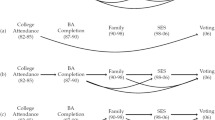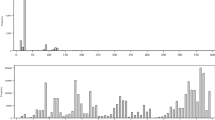Abstract
The subject of this research is whether ideological preferences play a major role in explaining voters' refusal to reelect some members of the U.S. House of Representatives. If ideological control is important, one would expect to find a large difference between the voting record of a rejected incumbent and his or her replacement. In distinction, whenever voters must replace a congressman or congresswoman because that person had died in office or chose to run for higher office, the hypothesis of ideological tracking implies that the newly elected member of Congress will resemble his or her predecessor. The data confirm these hypotheses and show, as well, that ideological control exists within parties and not only between them; that the degree of voters' ideological control is as great over senior congressmen and congresswomen as over junior ones; and that voters' concern about ideology has increased over the last two decades.
Similar content being viewed by others
References
Campbell, Angus, Philip Converse, Warren Miller, and Donald Stokes (1960).The American Voter. New York: Wiley.
Converse, Philip (1964). “The Nature of Belief Systems in Mass Publics.” In David Apter (ed.),Ideology and Discontent. New York: Free Press.
Cooper, Joseph, and William West (1981). “Voluntary Retirement, Incumbency and the Modern House.”Political Science Quarterly 96:279–300.
Dennis, Jack, and Donald McCrone (1970). “Pre-Adult Development of Political Party Identification in Western Democracies.”Comparative Political Studies 3:243–263.
Downs, Anthony (1957).An Economic Theory of Democracy. New York: Harper.
Erikson, Robert (1978). “Constituency Opinion and Congressional Behavior: A Reexamination of the Miller-Stokes Representation Data.”American Journal of Political Science 27:511–535.
Erikson, Robert, and Gerald Wright (1980). “Policy Representation of Constituency Interests.”Political Behavior 2:91–106.
Fiorina, Morris (1974).Congress: Keystone of the Washington Establishment. New Haven: Yale University Press.
Fiorina, Morris (1981). “Some Problems in Studying the Effects of Resource Allocation in Congressional Elections.”American Journal of Political Science 25:543–567.
Jacobson, Gary, and Samuel Kernell (1981).Strategy and Choice in Congressional Elections. New Haven: Yale University Press.
Jennings, M. Kent, and Richard Niemi (1968). “The Transmission of Political Values from Parent to Child.”American Political Science Review 62:169–184.
Johannes, John, and John McAdams (1981). “The Congressional Incumbency Effect: Is It Casework, Policy Compatibility, or Something Else? An Examination of the 1978 Election.”American Journal of Political Science 25:512–542.
Kau, James, Donald Keenan, and Paul Rubin (1982). “A General Equilibrium Model of Congressional Voting.”Quarterly Journal of Economics 97:271–293.
Kuklinski, James, and Donald McCrone (1980). “Policy Salience and the Causal Structure of Representation.”American Politics Quarterly 8:139–164.
Nie, Norman, Sidney Verba, and John Petrocik (1979).The Changing American Voter. Cambridge, Mass.: Harvard University Press.
Pierce, John (1970). “Party Identification and the Changing Role of Ideology in American Politics.”Midwest Journal of Political Science 14:25–42.
Pomper, Gerald (1975).Voter's Choice. New York: Dodd, Mead.
Powell, Lynda (1982). “Issue Representation in Congress.”Journal of Politics 44:658–678.
Repass, David (1971). “Issue Salience and Party Choice.”American Political Science Review 65:389–400.
Tufte, Edward (1978).Political Control of the Economy. Princeton: Princeton University Press.
Yiannakis, Diana (1981). “The Grateful Electorate: Casework and Congressional Elections.”American Journal of Political Science 25:568–580.
Author information
Authors and Affiliations
Rights and permissions
About this article
Cite this article
Glazer, A., Robbins, M. Voters and roll call voting: The effect on congressional elections. Polit Behav 5, 377–389 (1983). https://doi.org/10.1007/BF00987562
Issue Date:
DOI: https://doi.org/10.1007/BF00987562




